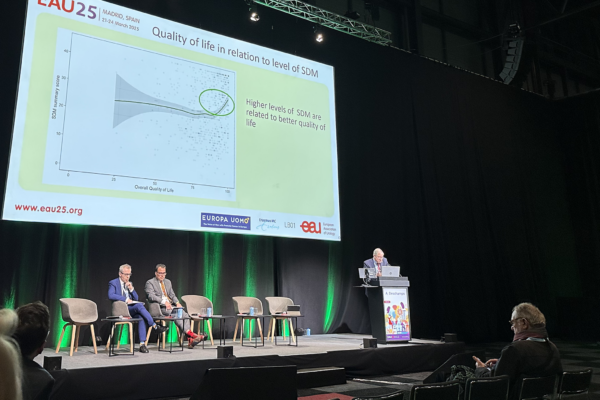First results from Europa Uomo’s shared decision making study announced at EAU Congress
A major new Europa Uomo study has concluded that the more men are involved in decisions about their prostate cancer, the better their resulting quality of life.
The research also found that shared decision-making results in men having fewer regrets about decisions made.
The findings come from the Europa Uomo Patient Reported Shared decision making Study (EU-PRESS), based on a detailed survey of 613 men across Europe who had undergone prostate cancer treatment since January 2022. The first results were presented at the European Association of Urology (EAU) Congress on 21st March (pictured).
In an online questionnaire conducted in 2024, men were asked to answer questions about their prostate cancer treatment and the extent to which they made decisions jointly with doctors. They also provided information about their quality of life and how much they regretted decisions made. The information was converted into scores for shared decision making, quality of life and decision regret.
Data analysis by Erasmus Medical Centre in the Netherlands found that, overall, 38-40% of men experienced moderate or strong regret about the treatment decisions made. These men were more likely to have rated the level of their shared decision making as poor.
Similarly, men who rated their quality of life as lower were also more likely to have felt less involved in decisions about their treatment.
With quality of shared decision making scored on a scale of 1 to 100, respondents' experience averaged 62, with a range from 40 to 84.
Europa Uomo’s André Deschamps, who presented the study to urologists at the EAU Congress, said: “We have known for a while that, because prostate cancer treatments can bring adverse effects, many men come to experience regret about the treatment decision made.”
“Now our new EU-PRESS study provides evidence that this regret is less likely to occur – and quality of life is likely to be better – if patients are closely involved in their treatment decisions.”
These preliminary findings will be followed by the publication of more detailed data later this year.
